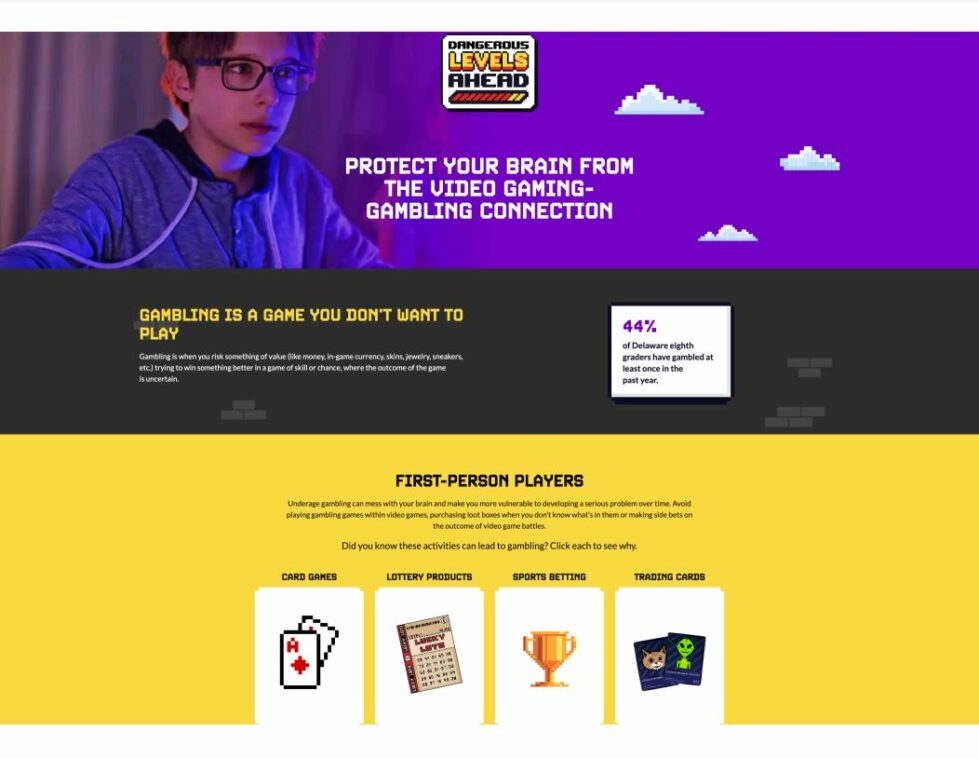
Gambling ads during sports games add to tendencies kids learn in video games and on social media, according to the Delaware Council on Gambling Problems. Photo by Jonathan Petersson/Pexels
With the advent of March Madness and the NCAA’s national basketball tournament comes an avalanche of flashy ads for websites encouraging people to bet on games.
But if you think that’s the first time a child is exposed to the evils of a modern world bent on addicting youth to gambling, think again, says John Schmidt, the prevention services coordinator for youth at the Delaware Council on Gambling Problems.
For many young people, that grooming starts with monetized video games like Candy Crush or Farmville and the emotional rewards of social media apps like Facebook, Snapchat and Instagram,

John Schmidt
All of them encourage behaviors that pave the superhighway to gambling, says Schmidt.
In games, the microtransactions often offer the promise of something that will be more lucrative than the money spent.
Games have changed in the last decade, he agreed. Games once could be bought for a flat fee and played under they were solved without spending another penny.
Now most can be downloaded for free, but require purchases to move ahead when players want better tools, better costumes, even additional playing time.
The purchases more directly relatable to gambling are microtransactions in games that offer kids “loot boxes” for a fee. Many times, the kids don’t know what’s in loot boxes but are hoping for a valuable tool or weapon.
That’s a form of gambling, Schmidt said.
“So what’s happening is more and more kids are spending more and more money trying to open these in hopes of winning valuable items,” Schmidt said. “There is no difference between that mechanically and buying a scratch-off. It’s the exact same thing. It’s just virtual. It just looks different. And it’s creating the same responses in the brain that any gambling activity actually would.”
The backlash against loot boxes is strong enough that when Overwatch, a popular game, came out with a new version, the makers themselves had removed loot boxes, Schmidt said.
Kids who play card games like Pokemon can suffer the same kind of emotional reactions as gamblers when they buy a deck of cards hoping to find a powerful card, he pointed out.
With social media, he said, “You just get caught up in the zone, you’re focused, you’re being you’re isolated and you’re just seeking rewards, and sometimes you’re even seeking things like attention, affection and validation, which is sort of another conversation, but it’s one that I have in the classroom with kids.”
In Delaware, nearly 44% of youth surveyed in middle and high schools admit to having gambled in the past year, according to the council.
Yet, 66% of parents have never talked to their kids about gambling.
“We know that kids who are introduced to gambling by the age of 12 are four times more likely to develop a gambling problem,” Schmidt said. “We want parents to understand that what seems so harmless, a simple card or skill game, can—for some children—lead to a dangerous gambling addiction.”

The Delaware Council on Gambling Problems has created websites that help parents learn more about gambling and how to talk to their kids about it.
Signs of gambling trouble
Jennifer Allen of Camden was surprised to see her middle school son unable to stop spending money on micropurchases as the COVID-19 pandemic hit.
Playing Xbox games connected him to his friends during the lockdown, she knew.
But then money started to disappear from her credit card and her son didn’t seem to be able to stop playing the games, lying about how much he was doing it.
He was playing Fortnight and he wanted to buy things for his character, including skins, which are cosmetic alterations.
“Obviously you have to use real money to buy these things for your character to build your character,” Allen said. “The more things you get for your character, the better your character plays in the game.”
He would give her some of the money he made mowing lawns, and she put her credit card on the game. She thought she had parental controls set but her son found a way to keep buying things without her permission.
Then money started disappearing from the account. Her son denied using it, until she said she was going to bank and the police because someone was stealing it. He confessed it was him.
She wanted to be lenient because she knew kids were really having a hard time being cut off from all that was normal and decided to make it a teaching moment.
Allen thought she deleted the card, but someone found it in the system and started using it. It turned out her son had a copy of it in the system and was charging purchases again.
“I’m like, you know you’re taking my money, my real money that I’m working for and you’re putting into a fake game?” she recalls.
MORE ON EDUCATION: Two Delaware students are heading to a national science camp
She decided to try a debit card for kids that’s supposed to teach them financial principles. The children are only supposed to be able to spend what’s on the card, which Allen attached to her checking account.
The card was hacked, and it wasn’t her son.
“I can’t even tell you how many times so I just cut that card off as well,” Allen said.
Now, her son is only allowed to turn his cash into gift cards to use on Xbox.
Along the way, her son stopped doing his homework and was putting off chores. When she’d call him to dinner, he would tell her he had to finish a game.
“So there was always where this game would come first,” she said.
She didn’t know it, but he was showing some of the warning signs of an addiction, which include:
- Missing school with no explanation.
- Grades suddenly drop; assignments are missing.
- Disinterest in other activities.
- Behavior that’s secretive, defensive or aggressive.
- Increased interest in money and value of possessions.
- Speaking openly about gambling or borrowing money.
Allen began to worry her son was developing a problem and found that the best way to punish him was to take away his Xbox.
She started talking to Schmidt about ways to handle her son’s focus on gaming.
“In so many ways, it’s actually gambling,” Schmidt said, because the kids are betting that these new tools and outfits will help them perform more and win better.
Allen’s son seems to have backed off his gaming mania, she said.
He’s in high school now, playing sports and will turn 15 soon and she’s not as worried about him.
Schmidt said that one of the things that game developers play on is the IKEA effect.
“It’s really all about the understanding that when we get something that we build ourselves, we’re more invested in it, and we’re less likely to abandon it,” Snyder said.
In gaming, he said, “it’s much easier for someone to start using money to continue because they spent so much time building and investing in the game and they don’t want to feel like it’s all for naught, so they’ll spend money.”
Allen wasn’t alone in setting up ways for her son to keep gaming.
The council says that there’s a trend now of parents signing up for fantasy sport leagues and letting their kids participate under their names.
To help educate parents, and help those parents educate their kids, the council worked with Aloysius Butler & Clark, a Wilmington marketing company, to a create a Dangerous Levels campaign with two websites, one for parents and one for kids.
“Our new websites help parents and educators start the conversation with their kids and students.,” Schmidt said. “We provide downloadable posters and flyers and even an online quiz to see who knows and understands the signs of gambling. Our site just for kids helps them understand the risks of gambling and how to seek help if they think they have a gambling addiction.”
The council also offers a free program throughout the school year, featuring an interactive presentation that engages students and educates them on the dangers of gambling.
So far, 24 schools have hosted a presentation, with 12 more planned this school year.
The council urges families not to go it alone. If you think your child has a gambling issue, you can talk to one of their trained counselors by calling the council hotline for a referral: 1-888-850-8888.
It’s so much easier for younger people to get to that point, Snyder said.
“It’s not the racetrack. It’s not the sports betting. It’s not the poker game. It’s not the casino,” he said. “There’s all these other pathways that they can groom you psychologically by using some of the same tactics that they’ve been using for decades.”
RELATED STORIES:

Betsy Price is a Wilmington freelance writer who has 40 years of experience, including 15 at The News Journal in Delaware.
Share this Post


